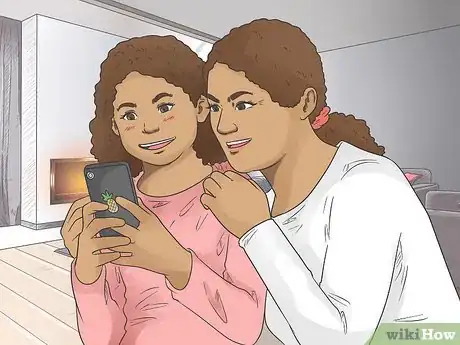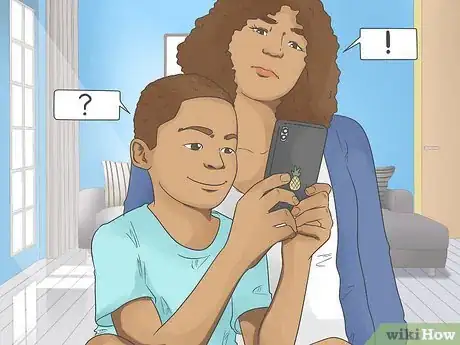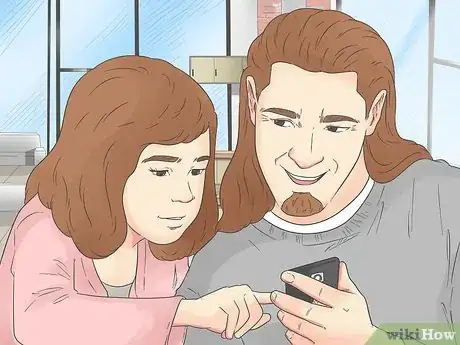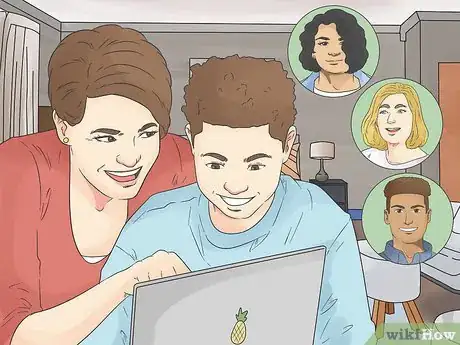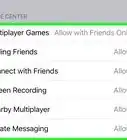This article was co-authored by Rachel Eddins, M.Ed., LPC-S and by wikiHow staff writer, Amy Bobinger. Rachel Eddins is a Licensed Professional Counselor and the Executive Director of Eddins Counseling Group. With more than 20 years of experience, she specializes in working with clients with eating disorders, anxiety and depression, relationship issues, and career obstacles. Rachel earned a BA in Psychology from The University of Texas at Austin and an MEd in Counseling from The University of Houston. She received a Group Psychotherapist Certification from the American Group Psychotherapy Association and an Intuitive Eating Counselor Certification through Intuitive Eating Pros. She is also recognized as a Master Career Counselor through the National Career Development Association.
There are 18 references cited in this article, which can be found at the bottom of the page.
This article has been viewed 7,490 times.
Kids today are growing up in an unprecedented world filled with technology. As a parent, you want to protect them, but you also want to give them the skills they need to make good decisions for themselves. Luckily, teaching your children to use social media in a healthy way now can give them the tools to manage it throughout their lives. Keep reading for tips on how you can guide your tweens or teens learn to create a responsible, safe social media presence!
Steps
Start slowly by allowing one social media app at first.
-
This will make it easier to monitor how they're using it. Talk to them about the app they'd most like to use, and look into it to see if it's appropriate for your child. There are pros and cons to any social media apps, but common sites like Instagram (there's an option for teens), Snapchat, and Twitter can all be safe if you monitor their use and teach your child to make good choices.[1] X Research source
- Take your child's personality into account—if they're self-conscious about their appearance, Insta might not be the healthiest choice for their self-image, for instance.
- Don't allow any apps that match users, like teen dating or "meetup" apps.[2] X Research source
- If you notice your child is following any accounts with explicit or inappropriate content, step in immediately.
Agree on time limits for their social media use.
-
Empower your kids by working together to create the rules. Talk to them about why it's important to have limits on how much time they spend on social media, and get their feedback about how they imagine using it.[3] X Expert Source

Licensed Professional Counselor Expert Interview. 23 March 2022. When you allow them to help set the rules, you're teaching them that they're capable of controlling their relationship with social media and technology in general.[4] X Research source- You could say, "When people spend too much time online, it can become harder to appreciate the things that are going on around them. I don't want that to happen to you, but I'm willing to work with you to find something that's fair."
- For instance, you might agree that your kids can use social media for an hour a day, as long as it's not in the 30 minutes before bed. You might also agree on screen-free zones in the house, like at the dinner table.[5] X Research source
Set consequences for breaking the rules.
-
Get your kids involved in this part, too. Talk about what they think should happen if they go over their allotted screen time, attempt to go around parental controls on their devices, or act in an inappropriate or unkind way while they're online. They're less likely to argue about losing privileges if they already agreed that was a fair consequence.[6] X Research source
- The consequences might include things like losing their phone for a week, having their activity monitored more closely, or missing out on another privilege they enjoy.
Follow their social media accounts.
-
Check in every so often to see how they're using their page. While you do want your kids to learn to be autonomous, you need to know what they're doing online so you can give them guidance when they need it. Get familiar with the apps and sites your kids are using, and create your own account so you can monitor their activity. If you see anything you're concerned about, bring it up in a calm, neutral way, then talk about the importance of making good choices online.[7] X Research source
- Pay attention to the comments they post and receive. These can be big clues into whether your child is using social media appropriately, how they're feeling, and whether they're being bullied (or bullying someone else).
- Periodically check their browser history, as well, so you can see the kind of websites they're looking at.[8] X Trustworthy Source American Psychological Association Leading scientific and professional organization of licensed psychologists Go to source
- For added peace of mind, use monitoring software to keep an eye on what they're up to online.
Help them find positive role models to follow.
-
Fill up their feed with inspirational messages. You can't control everything your child will see on social media, but by helping them find accounts with a positive message, you can at least stack the deck. There are plenty of people out there who use their social media to encourage, inspire, and uplift others, so do a little research to find pages that match your child's interest. Try checking out:[9] X Research source
- Athletes
- World leaders
- Writers
- STEM researchers
- Climate change activists
- Body positivity proponents
- Nonprofits
Create an open atmosphere so your kids will talk to you.
-
Keep an open, curious attitude about what they're doing. If you act anxious or outraged about what your kids are doing online, they're probably going to shut down. On the other hand, if they feel like you're genuinely interested in what apps they're using and the types of pages they like to follow, they'll be more comfortable talking to you.[10] X Research source
- For instance, if your child asks you if they can download a new type of social media app, you might ask how they learned about it, who they know that uses it, and what kind of things they'd like to do on it.
- If your kid comes to you with concerns about something they saw online, reassure them that you're glad that they were honest with you, even if you feel upset about what they said.
Encourage your kids to be authentic online.
-
Putting up a false front can make them dissatisfied with real life. Your teen might sometimes feel pressured to pretend to be someone they're not. It's fine to mostly post the highlights of your life and leave out the parts that aren't as interesting, like only snapping their dessert and not the broccoli they had with dinner. But if you notice that your teen frequently exaggerates or posts things that aren't true, you should talk to them about that.[11] X Trustworthy Source Child Mind Institute Nonprofit organization providing evidence-based care for children with mental health and learning disorders and their families Go to source
- Try saying something like, "I noticed you posted that you were heading to the beach when you were really at home last weekend. I bet you probably wanted to share something exciting, and you were probably wishing you really were at the beach. I just don't think being untruthful is the best way to impress people or make friends."
- You could also make proactive suggestions, like, "I love your smile in that picture, it's so genuine! I think you should share that one with your friends."
Teach them to think beyond people's social media image.
-
Give them critical thinking skills to question online perfection. Scrolling through social media, teens can sometimes start to feel like everyone's life is better than theirs. Everyone's always smiling or having fun with their friends, right? Real life is often messy, boring, or upsetting, but these don't usually make it onto a social media feed. Help your kids learn to recognize that social media is heavily curated, and there's almost always more to the story than what they can see.[12] X Trustworthy Source Child Mind Institute Nonprofit organization providing evidence-based care for children with mental health and learning disorders and their families Go to source
- One exercise that can help is to ask your child questions like, "What do you think might have been cropped out of this picture?" or, "Do you think that person is the same in real life as they seem online?"
Help them recognize negative feelings from social media use.
-
Social media has been linked to feelings of jealousy, anxiety, and loneliness. It can also have a negative effect on body image. However, that doesn't mean you should necessarily keep your teen away from it altogether. Instead, help them learn to recognize when they start feeling that way. Then, talk about healthy ways to cope with those feelings, such as:[13] X Research source
- Unfollowing people or pages that regularly make them feel that way
- Putting down their phone for a while
- Deactivating their social media if they need a longer break
- Listing things they're grateful for in their own life
- Focusing on things they like about their body, like being able to swim, run, and hug
- Joining a new club or activity so they can make friends
Emphasize the positive aspects of social media.
-
Let them know you understand why they enjoy it. Social media has its pitfalls, but there's a lot that's good about it, too. If you talk about some of the ways your child can use social media in a positive way, they might feel more like you understand them, so they may be more likely to talk to you about issues and respect the guidelines you came up with together. For instance, you might encourage your child to use social media to:[14] X Research source
- Talk to family members or friends who live far away
- Support friends who are having a hard time
- Share something creative like artwork, music, or photography
- Get involved with their community
- Spread the word about a cause they believe in
Tell them not to post anything they wouldn't say in real life.
-
Remind them that bullying is never ok. Unfortunately, it's easy to be mean online because you don't have to say the words directly to someone's face. However, words are still hurtful, even if they're on a screen, so teach your child that it's important to treat others with respect. Let them know that they're not to use their social media to post anything hurtful or that's meant to embarrass someone, and have consequences in place if they break that rule.[15] X Research source
- Try asking a question like, "How can you be supportive and kind online so you're making a positive impact on the world?"
- You might also tell them that before they post anything, they should always ask themselves, "What would my grandma think if she saw this?"
- Ask them to tell you if they see others posting things that are unkind, as well.
Explain why they shouldn’t post personal info publicly.
-
Have frequent conversations about the need for privacy online. Tweens and teens might not realize the dangers of sharing things like their name, phone number, birthdate, or school name on their social media profiles. Use age-appropriate language to explain why they need to keep their personal information safe, and have very clear boundaries about what they can and can't share.[16] X Expert Source

Licensed Professional Counselor Expert Interview. 23 March 2022.- For instance, you might say, "I know you're excited about our vacation, but remember not to post about it or share any pictures until after we're home. It's not safe to share that our family will be out of town for a few days."[17] X Trustworthy Source American Psychological Association Leading scientific and professional organization of licensed psychologists Go to source
- Double-check the privacy settings on their social media accounts to make sure their personal info and posts can only be seen by friends.[18] X Research source
- No matter what app you use, if there's a geo-tagging feature that shows the location that pictures were taken, turn it off.
- Consider making a rule that your child can only friend people on social media if they know them in real life to help protect their privacy.
Discuss how their online presence could affect their future.
-
Help them think about the way they're presenting themselves. Kids often don't realize how inappropriate photos, mean-spirited comments, and careless language can affect them later.[19] X Expert Source

Licensed Professional Counselor Expert Interview. 23 March 2022. If you see that they've posted something that concerns you, ask them to look at it through the eyes of an admissions counselor or hiring manager. Also, teach them that even if they delete these things later, there's always a chance that someone could screenshot it, so it could come back on them later.[20] X Research source- When they're old enough for the conversation, talk to them about the dangers of sexting. Let them know that in addition to their embarrassment if their messages or photos got out, if they're under a certain age, they could actually get in legal trouble for sending explicit pictures online.[21] X Research source
Be honest about the dangers of online predators.
-
Help them understand red flags and what to do if they see them. It can be hard to talk about something as uncomfortable as sexual predators, but it's an important part of online safety. Make sure your child knows that if anything ever makes them uncomfortable, no matter how small it seems, they should come to you right away. Talk to them about other types of behaviors they should watch out for, as well, like someone they don't know asking really personal questions or pushing them to send photos.[22] X Research source
- Be really clear about the fact that sometimes online predators pretend to be much younger than they are as a way to make kids feel comfortable sharing information with them. Explain that's why it's important for your child to only talk to people they know in real life.[23] X Trustworthy Source Understood Nonprofit organization dedicated to resources and support to people with thinking differences, such as ADHD or dyslexia Go to source
Use news stories and anecdotes as teachable moments.
-
Sometimes it helps to have an outside source verify what you're saying. As an adult, you know that there's a lot in the world that you need to protect your child from, but it can be hard to convince them of that. You don't want to scare them, but you do want them to know that danger is real. If you see real-world examples of online predators, cyber bullying, privacy violations, or any other online concerns, point them out to your child and talk again about why social media safety is so important.[24] X Research source
- For instance, you might say, "I just read a study about teens feeling insecure when they compare themselves to what they see on social media. Do you ever feel that way?"
Set a good example with your own social media use.
-
Follow the same rules you set for your child. Sure, maybe your screen time limits don't have to be quite as strict, but if you really want your child to learn healthy social media use, you have to show them what it looks like. Have set times a day where you put down your phone, and respect any screen-free areas in the home.
- Be honest with your child if this is hard for you. If you allow them to see you working to overcome it, they'll learn that even if it isn't easy, maintaining a healthy balance with social media is important, and it's something worth doing![25] X Research source
Expert Q&A
-
QuestionHow do you entertain kids without screens?
 Rachel Eddins, M.Ed., LPC-SRachel Eddins is a Licensed Professional Counselor and the Executive Director of Eddins Counseling Group. With more than 20 years of experience, she specializes in working with clients with eating disorders, anxiety and depression, relationship issues, and career obstacles. Rachel earned a BA in Psychology from The University of Texas at Austin and an MEd in Counseling from The University of Houston. She received a Group Psychotherapist Certification from the American Group Psychotherapy Association and an Intuitive Eating Counselor Certification through Intuitive Eating Pros. She is also recognized as a Master Career Counselor through the National Career Development Association.
Rachel Eddins, M.Ed., LPC-SRachel Eddins is a Licensed Professional Counselor and the Executive Director of Eddins Counseling Group. With more than 20 years of experience, she specializes in working with clients with eating disorders, anxiety and depression, relationship issues, and career obstacles. Rachel earned a BA in Psychology from The University of Texas at Austin and an MEd in Counseling from The University of Houston. She received a Group Psychotherapist Certification from the American Group Psychotherapy Association and an Intuitive Eating Counselor Certification through Intuitive Eating Pros. She is also recognized as a Master Career Counselor through the National Career Development Association.
Licensed Professional Counselor Set aside 10 minutes a day to have quality time with your child — let the child choose how you spend it. This will build your child’s self-esteem and form strong attachment bonds, which ultimately is the best way you can protect your child online and offline.
Set aside 10 minutes a day to have quality time with your child — let the child choose how you spend it. This will build your child’s self-esteem and form strong attachment bonds, which ultimately is the best way you can protect your child online and offline.
You Might Also Like
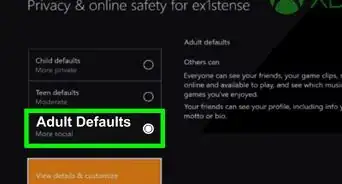


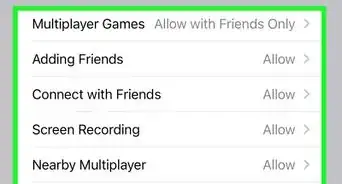
References
- ↑ https://www.workingmother.com/is-your-kid-ready-forinstagram-snapchat-twitter-facebook
- ↑ https://www.commonsensemedia.org/blog/16-apps-and-websites-kids-are-heading-to-after-facebook
- ↑ Rachel Eddins, M.Ed., LPC-S. Licensed Professional Counselor. Expert Interview. 23 March 2022.
- ↑ https://kidshealth.org/en/parents/social-media-smarts.html
- ↑ https://healthblog.uofmhealth.org/childrens-health/5-ways-to-reset-your-relationship-screens
- ↑ https://www.hopkinsallchildrens.org/ACH-News/General-News/On-Call-Talking-With-Your-Kids-about-Social-Me
- ↑ https://www.hopkinsallchildrens.org/ACH-News/General-News/On-Call-Talking-With-Your-Kids-about-Social-Me
- ↑ https://www.apa.org/topics/social-media-internet/technology-use-children
- ↑ https://www.weforum.org/agenda/2019/11/uk-girls-social-media-positive-role-models/
- ↑ https://www.hopkinsallchildrens.org/ACH-News/General-News/On-Call-Talking-With-Your-Kids-about-Social-Me
- ↑ https://childmind.org/article/social-media-and-self-doubt/
- ↑ https://childmind.org/article/social-media-and-self-doubt/
- ↑ https://www.unicef.org/stories/social-media-bad-teens-mental-health
- ↑ https://kidshealth.org/en/parents/social-media-smarts.html
- ↑ https://kidshealth.org/en/parents/social-media-smarts.html
- ↑ Rachel Eddins, M.Ed., LPC-S. Licensed Professional Counselor. Expert Interview. 23 March 2022.
- ↑ https://www.apa.org/topics/social-media-internet/technology-use-children
- ↑ https://kidshealth.org/en/parents/social-media-smarts.html
- ↑ Rachel Eddins, M.Ed., LPC-S. Licensed Professional Counselor. Expert Interview. 23 March 2022.
- ↑ https://www.hopkinsallchildrens.org/ACH-News/General-News/On-Call-Talking-With-Your-Kids-about-Social-Me
- ↑ https://www.healthychildren.org/English/family-life/Media/Pages/Tips-for-Parents-Digital-Age.aspx
- ↑ https://kidshealth.org/en/parents/social-media-smarts.html
- ↑ https://www.understood.org/articles/en/9-ways-to-protect-your-child-from-online-predators
- ↑ https://www.fosi.org/good-digital-parenting/10-tips-protect-your-child-cyber-bullying
- ↑ https://kidshealth.org/en/parents/social-media-smarts.html
About This Article

